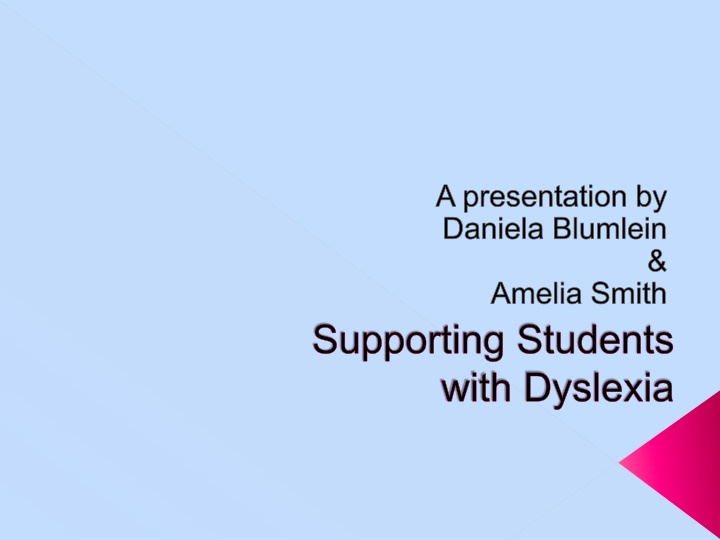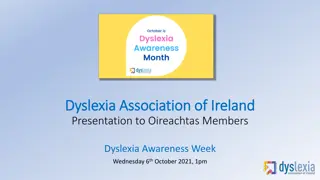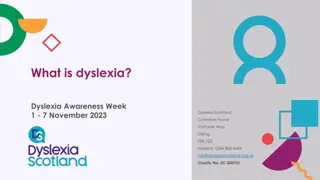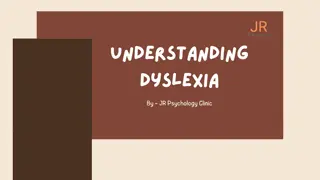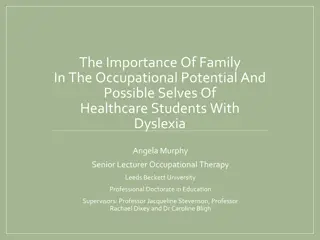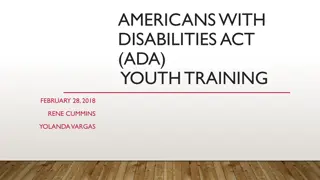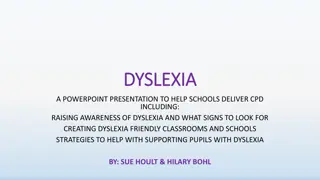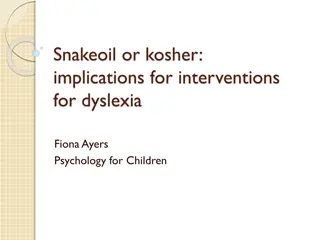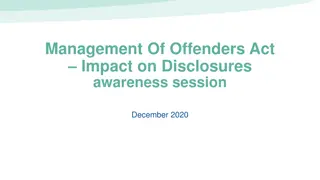Supporting Students with Dyslexia: Understanding, Disclosure, and Reasonable Adjustments
This presentation covers important aspects of supporting students with dyslexia, including defining disability, understanding dyslexia, the choice of disclosure, obligations under the Equality Act 2010, and suggestions for reasonable adjustments and support to help dyslexic students succeed in their academic endeavors.
Download Presentation

Please find below an Image/Link to download the presentation.
The content on the website is provided AS IS for your information and personal use only. It may not be sold, licensed, or shared on other websites without obtaining consent from the author.If you encounter any issues during the download, it is possible that the publisher has removed the file from their server.
You are allowed to download the files provided on this website for personal or commercial use, subject to the condition that they are used lawfully. All files are the property of their respective owners.
The content on the website is provided AS IS for your information and personal use only. It may not be sold, licensed, or shared on other websites without obtaining consent from the author.
E N D
Presentation Transcript
A presentation by Daniela Blumlein & Amelia Smith Supporting Students with Dyslexia
Definition of Disability Any condition that may have a significant adverse effect on a person s daily life This includes physical disabilities, mental health problems and learning disabilities, as well as long term conditions Equality Act 2010
Dyslexia A condition covered under the Equality Act 2010 Individuals may experience difficulties with reading, writing and spelling Possible weakness in processing information, sequencing, short-term memory and organizing activities Affects approximately 10% of the population White (2007)
Dyslexia Dyslexia does not affect intellectual ability A collection of difficulties rather than a single symptom Life-long condition Individuals with dyslexia have weaknesses but also strengths Sanderson-Mann & McCandless (2006)
Disclosure Disclosure of dyslexia is a personal choice and there is no obligation for students to disclose a disability. Students may choose not to disclose dyslexia due to fear of stigma and discrimination ( McPheat, 2014) Disclosure will help students to access appropriate support whilst studying at UWL.The Wellbeing team will develop and Individual support plan for the student.
Equality Act 2010 The act requires employers and education providers to make reasonable adjustments for students with disabilities.
Reasonable Adjustments and Support Allow students to record lessons on a voice recorder Provide handouts on coloured paper For handouts use dyslexia friendly fonts such as Arial and use a size 12-14 font size Allow students access to quiet study areas to complete written work When using PowerPoint , avoid a white background with black writing on it . Allow students to use specialist software for course work ( e.g. speech recognition etc)
Reasonable Adjustments and Support Assist students to contact disability support via the Wellbeing Team and Student Services Use a mix of teaching methods to address all learning styles Maintain confidentiality Display and open and disability friendly attitude Provide pastoral support for students Allow student to negotiate submission deadlines for written course work Allow student to negotiate time extensions for exams ( within UWL regulations) McPheat ( 2014)
Reasonable Adjustments and Support If a course includes work placements , students with disabilities must be supported and reasonable adjustments must be in place. Students should be encouraged to disclose their disability to their mentor at the placement , however this is not mandatory.
Further Support Lecturers and Students at UWL can obtain support from the Wellbeing Team. wellbeing.team@uwl.ac.uk
Amelias Story Amelia Smith is a student on the Post Graduate Diploma in Adult Nursing at UWL.
References Great Britain. Parliament. Equality Act 2010: Elizabeth II. Chapter 15. (2010) London: Stationery Office. McPheat, C. (2014) Experiences of Nursing Students with Dyslexia on Clinical Placement , Nursing Standard, 28(410, pp.44-49. Sanderson-Mann, J. and McCandless, F. (2006) Understanding Dyslexia and Nurse Education in the Clinical Setting , Nurse Education in Practice , 6 (3), pp.127-133. White, J. (2007) Supporting Nursing Students with Dyslexia in Clinical Practice. Nursing standard, 21(19), pp.35-42
